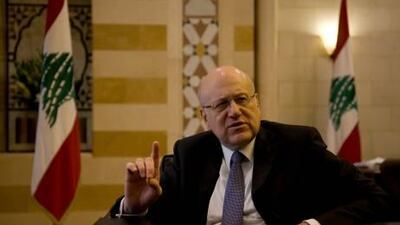BEIRUT // The Arab League may be toughening its stance against Syria, but Lebanon's Prime Minister Najib Mikati is certain of one thing: his country will not be dragged into the escalating crisis across the border.
While other members of the Arab League have become increasingly vocal, even going so far last week as to call for Syrian President Bashar Al Assad to step down, Lebanon has remained on the periphery.
The country voted against suspending Syria from the Arab League in November and was the only member state not to endorse last week's calls for Mr Al Assad to transfer power to his deputy.
The country does, however, say it will abide by any international sanctions against Syria.
Mr Mikati is adamant that this policy is the only way of maintaining stability in Lebanon.
"Definitely I am concerned about what is going on in Syria, as I am concerned if there is any kind of fight or war in any Arab countries," Mr Mikati said yesterday in an interview with The National at his office overlooking downtown Beirut.
"But...I am more concerned about what's going on in Syria because it has a direct reflection on Lebanon. What I'm trying to do and my policy is to disassociate, to shy away from what's going on in Syria."
Some critics have called the government's stance tacit support for the Syrian regime.
Although Syrian troops left in 2005 after a 29-year military presence in Lebanon, the country still wields significant influence on its smaller neighbour. With Lebanon's tempestuous political scene split between groups still supporting the Al Assad regime, including Hizbollah, there is concern with the possibility of violence spilling across the border.
Already, thousands of Syrian refugees have crossed into Lebanon in the 10 months since the uprising began and Syrian forces have made incursions into Lebanese territory. Last week, local media quoted the Syrian ambassador saying that Lebanon needed to do more to prevent weapons being shuttled to opposition fighters across the porous border between the two countries.
The opposition March 14-bloc has voiced support for the uprising and last week welcomed a statement issued by the main political opposition group, the Syrian National Council, that called for a "new page" in Lebanon-Syria relations.
Mr Mikati would not be drawn on the comments, but said that this policy of "disassociation" is the only way to preserve the period of relative stability that Lebanon is witnessing.
"What concerns me in Syria today, the most important [thing] is stopping this kind of bloodshed," he said. "That is the most important for me. Every day we are hearing killing from both parties. This should stop."
The 56-year-old premier said the countries' "historical and geographical" ties have also been a factor in forming the policy that is in the "interest of Lebanon".
"Historically we were always complaining about others interfering in our domestic and national issues," he said.
"The Syrians, they know how to solve it. I'm not the one who will give lessons to the Syrians or others, [on] a condition nobody will give me lessons. I am Lebanese and I know the interests of my country."
Mr Mikati previously held the post of prime-minister in 2005, briefly leading a caretaker government in the aftermath of the assassination of the late Rafiq Hariri.
His second premiership came several years later when the government of Hariri's son Saad, collapsed at the beginning of 2011, following disputes revolving around the Special Tribunal for Lebanon (STL) - the court investigating the Hariri-murder.
After Mr Hariri was ousted as prime minister, Mr Mikati was nominated by the Hizbollah-led March 8 bloc.
Critics were quick to describe him as the Hizbollah-candidate and predicted that even if he was able to form a government, it would be short-lived.
But, just over a year after he was nominated for the post and six months after he formed a cabinet and officially took the position of prime-minister, Mr Mikati has proved more resilient than his naysayers predicted.
Despite the staunch opposition of Hizbollah and its allies to the STL, he managed to avoid political crisis by finding a way to pay Lebanon's financial obligations to the tribunal late last year.
The Hague-based court has indicted four men identified as Hizbollah supporters and differences over the STL have developed into one of the most divisive issues within Lebanese politics.
While the suspects have yet to be apprehended by Lebanese authorities, Mr Mikati says that since the indictment was released last June "all the necessary procedures" are being taken.
While the looming questions of Syria and the STL remain, Mr Mikati's government faces a raft of pressing domestic issues. The country is struggling with massive public debt, daily power cuts and a turbulent political environment.
But, the premier says that maintaining stability and pushing for a "permanent peace", for the time being, is his priority.
Mr Mikati - a father of three from Lebanon's northern Sunni heartland, Tripoli - is man of vast wealth, not unlike other Lebanese political figures. But, in a country of wealthy politicians, his fortune, estimated at US$2.8 billion (Dh10.2bn), outranks the others.
Named by Forbes as the richest man in Lebanon - alongside his brother Taha - the self-made billionaire has business interests in fields including telecoms. So, why was he drawn to politics?
"I am not keen just for the position, I'm keen to help and to serve, if I can really avoid any bad things on my country I will not hesitate one second," he said.

